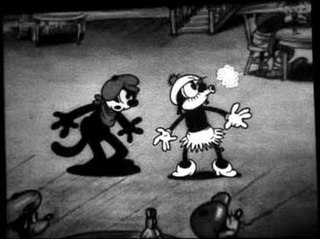Related Research Articles

George Joseph Herriman III was an American cartoonist best known for the comic strip Krazy Kat (1913–1944). More influential than popular, Krazy Kat had an appreciative audience among those in the arts. Gilbert Seldes' article "The Krazy Kat Who Walks by Himself" was the earliest example of a critic from the high arts giving serious attention to a comic strip. The Comics Journal placed the strip first on its list of the greatest comics of the 20th century. Herriman's work has been a primary influence on cartoonists such as Elzie C. Segar, Will Eisner, Charles M. Schulz, Robert Crumb, Art Spiegelman, Bill Watterson, and Chris Ware.

Krazy Kat is an American newspaper comic strip, created by cartoonist George Herriman, which ran from 1913 to 1944. It first appeared in the New York Evening Journal, whose owner, William Randolph Hearst, was a major booster for the strip throughout its run. The characters had been introduced previously in a side strip with Herriman's earlier creation, The Dingbat Family, after earlier appearances in the Herriman comic strip Baron Bean. The phrase "Krazy Kat" originated there, said by the mouse by way of describing the cat. Set in a dreamlike portrayal of Herriman's vacation home of Coconino County, Arizona, KrazyKat's mixture of offbeat surrealism, innocent playfulness and poetic, idiosyncratic language has made it a favorite of comics aficionados and art critics for more than 80 years.

Craig Yoe is an American author, editor, art director, graphic designer, cartoonist and comics historian, best known for his Yoe! Studio creations and his line of Yoe Books.

Sleepy Holler is a 1929 silent animated short film by Winkler Pictures, and stars Krazy Kat. It is the character's last silent film. It is also the last film of the series to be distributed by Paramount Pictures.

The Apache Kid is a 1930 cartoon short distributed by Columbia Pictures and features Krazy Kat. The film is the character's 149th film.
Lil' Ainjil is a 1936 short animated film distributed by Columbia Pictures, and features Krazy Kat.
Love's Labor Lost is a 1920 short, animated film by Bray Productions and is one of the silent Krazy Kat cartoons. The film's title references a play by William Shakespeare.

The Stork Exchange is a 1927 silent animated short film starring Krazy Kat. This film was thought to be lost but has been found. It is also one of the earliest in the cartoon series to feature Manny Gould and Ben Harrison's version of Krazy, the first of few incarnations derived from George Herriman's famous character.
Searching For Santa! is a silent short film by Winkler Pictures, starring Krazy Kat. The cartoon was thought to be lost but was rediscovered in 2004.
The Mouse Exterminator is a 1940 short animated film in the Phantasies series, produced and distributed by Columbia Pictures. It marks the final theatrical appearance of Krazy Kat, the title character from George Herriman's comic strip.
Birth of Jazz is a 1932 short animated film by Columbia Pictures, featuring Krazy Kat.
Krazy Kat and Ignatz Mouse: A Duet, He Made Me Love Him, also simply known as A Duet, is a 1916 silent short animated film featuring Krazy Kat. It is among the earliest cartoons to feature Krazy who earlier achieved modest success through comic strips.
The Best Mouse Loses is a 1920 silent short theatrical cartoon by Bray Productions featuring Krazy Kat.
The Little Lost Sheep is a 1939 short animated film produced by Columbia Pictures. It is one of the two penultimate films in the Krazy Kat series, the other being Krazy's Shoe Shop, as both were released on the same day.
Soda Poppa is a 1931 short animated film by Columbia Pictures. It is one of many short films starring Krazy Kat.
A Family Affair is a silent short animated film by Bray Productions featuring Krazy Kat. It is the sixth Krazy short produced by the studio.
The Awful Spook is a silent short animated film created by the Bray Studio, featuring Krazy Kat.
The Dingbat Family is a comic strip by American cartoonist George Herriman that ran from June 20, 1910, to January 4, 1916. It introduced Herriman's most famous pair of characters: Krazy Kat and Ignatz Mouse, who later featured in Herriman's best-known strip Krazy Kat (1913–1944).

Krazy Kat Invalid is a silent short animated film distributed by Hearst-Vitagraph News Pictorial, and featuring Krazy Kat in one of the character's earliest animated appearances.
Events in 1916 in animation.
References
- ↑ "Krazy Kat".
- ↑ "George Herriman's KINOMATIC KRAZY KAT KARTOON KLASSICS". Amazon. 3 December 2004.